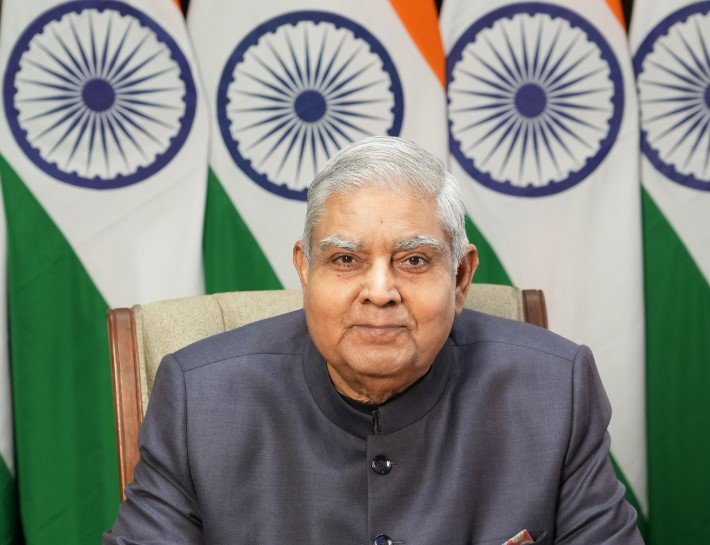Congress chief suggests resignation not as simple as it seems, says Dhankhar always backed government in Rajya Sabha
It’s not every day that India’s Vice President resigns mid-term — and certainly not without sparking a political storm. But that’s exactly what happened on July 21, when Jagdeep Dhankhar, citing health concerns, stepped down from his post as Vice President of India and Chairman of the Rajya Sabha.
And now, Congress president Mallikarjun Kharge has added fuel to the speculation, saying bluntly that the matter “is between him and Prime Minister Modi.” It’s a comment laced with suspicion — and Delhi is listening.
A resignation wrapped in mystery
Dhankhar’s resignation letter to President Droupadi Murmu was short and clinical. He simply said he needed to prioritise his health. No press conference. No farewell speech. Not even a public appearance since.
For a man known for his aggressive presence in the Upper House, the silence felt deafening.
Sources in the government said Dhankhar had been facing health issues for months and needed rest. But the timing — just months ahead of several key state elections and amid renewed opposition aggression — has raised eyebrows.
Even within BJP circles, the move came as a surprise.
Kharge’s statement: more than just words?
Speaking to reporters in Vijayapura, Karnataka, Congress President Mallikarjun Kharge didn’t hold back.
He accused Dhankhar of consistently suppressing opposition voices in the Rajya Sabha, especially when matters like farmer issues, caste atrocities, women’s safety, or communal violence were raised. “He never gave us an opportunity,” Kharge said.
But his most telling remark? “This is between him and Modi.”
It wasn’t a casual aside. In political language, especially coming from a Leader of Opposition, that phrase reads like a challenge. Was there more to Dhankhar’s exit than just health? Did he fall out with the Prime Minister? Was there internal pressure?
No answers yet. But the questions are multiplying.

Flashback: Dhankhar’s style and clashes in Rajya Sabha
Jagdeep Dhankhar, a former West Bengal Governor and BJP veteran, was elected Vice President in August 2022. His term was expected to last until 2027. But in just three years, he made more headlines than many of his predecessors combined.
He clashed frequently with the Opposition over procedural matters in the Rajya Sabha. And while he was applauded by BJP MPs for his assertive style, critics said he blurred the line between a neutral chair and a government enforcer.
One Congress MP, requesting anonymity, said, “He was like a BJP whip in disguise. Every time we raised something uncomfortable, he ruled it out or shut it down.”
Let’s take a look at some of the flashpoints:
-
Farmers’ protests: Repeated notices under Rule 267 were dismissed.
-
Manipur violence: Opposition walkouts over not being allowed to discuss the issue.
-
Women’s reservation bill: Controversial timeline and procedural hurdles.
-
Caste census debate: Ignored multiple calls for discussion, citing decorum.
Political reactions across the spectrum
While the Congress has been the most vocal, other parties too have responded — some with restraint, others with concern.
Here’s how the reaction has shaped up so far:
-
BJP: Officially maintained it was a health-related personal decision.
-
TMC: Called the resignation “unexpected and troubling.”
-
Shiv Sena (UBT): Demanded transparency, saying “resignation at this level shouldn’t be ambiguous.”
-
JD(U): Backed Kharge’s remarks, hinted at internal BJP pressures.
Interestingly, no Union Minister has yet addressed the issue in detail. Prime Minister Narendra Modi, who had once publicly praised Dhankhar’s handling of the House, has not commented on the exit.
What the Constitution says — and what politics interprets
According to Article 67(b) of the Constitution, a Vice President can resign by writing to the President. There’s no obligation to disclose reasons. But in politics, optics matter.
Here’s what the process and practice look like:
| Step | Constitutional Provision | Political Implication |
|---|---|---|
| Resignation | Article 67(b) | Can be accepted immediately |
| Successor | Election within 6 months | Speculation over ruling party’s pick |
| Chairmanship | Falls vacant immediately | Disrupts Rajya Sabha operations |
| Public Disclosure | Not mandatory | Lack of transparency breeds doubt |
Unlike Cabinet reshuffles, constitutional exits like this are rare. The last Vice President to resign was in 1969, when V.V. Giri stepped down to contest the presidential election. Dhankhar’s case is clearly different — and unexplained.
Why the timing is so sensitive
The resignation comes at a politically volatile time:
-
Parliament is in session.
-
State elections in Maharashtra, Haryana, and Jharkhand are around the corner.
-
The Opposition’s INDIA bloc is becoming increasingly vocal.
-
BJP is preparing its 2026 strategy, including reworking its leadership bench.
And in the middle of all that, the Vice President — the man who controls how much Parliament can talk — exits stage left.
For a ruling party obsessed with message control and optics, it’s an uncharacteristic moment of uncertainty.
One BJP insider said, “The health explanation is real. But it could also be that the party wants someone more aligned to the next phase.”
That’s open to interpretation — and that’s exactly where the Opposition is stepping in.
